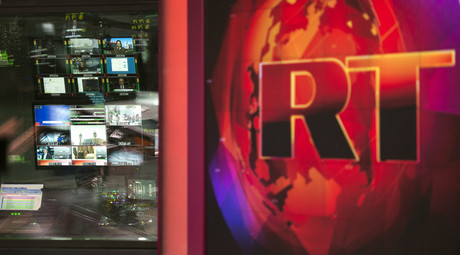

German youth magazine Neon planted journalist Martin Schlak at the RT Deutsch office in Berlin. His mission was to find out how “Russia’s truth” – to use his own term – is being made.
“I’m a spy,” Schlak admits.
He writes he was eager to learn if RT’s daily work would live up to the terms used by German mainstream media to describe it, such as “Putin’s propaganda broadcaster” and “the Kremlin’s weapon of hybrid warfare.”
To do that, Schlak enrolled as an intern and became “Putin’s man” for several weeks.
“What did I actually imagine would be there? A fax in the middle of the newsroom, sending orders from the Kremlin every minute?” Schlak asks himself ironically.
Reality turned out to be a bit more mundane. The self-styled spy mentions friendly co-workers, coffee machines and an intelligent chief editor speaking perfect German.
In the friendly atmosphere, Schlak’s cover appeared unexpectedly flimsy.
“I’m asking myself whether you’re a spy sent to us by the Bild newspaper,” an RT Deutsch employee joked, given how many questions Schlak was asking.
Fearing for his guise, the ‘mole’ tried to act by the playbook – but then something quite unexpected happened.
“I’m now hesitating about what I deem true,” Schlak said. “Who lies and who writes the truth? I don’t know anymore.”
“I trust my new colleagues – who I have known for only a couple of days – more than all of Germany’s large news agencies put together,” he says.
“Deutsche Welle is the taxpayer-funded international broadcaster in charge of giving coverage to the German and other perspectives on politics, culture and economy,” his article goes on. “Is it exactly the same what RT is doing, to promote understanding of Russia’s position?”
“Do I rashly call it propaganda because Russia, this giant kingdom, is foreign to me?”
The conundrum even drove Schlak to seek a psychologist’s help. He turned to Markus Appel, a psychology professor at the University of Koblenz-Landau.
“A human being has an inclination not to comply with the majority,”Appel said, citing a number of scientific experiments that examined human behavior in groups.
However, Schlak eventually overcame his doubts and remained an MSM supporter after he took a look at the results of one of the RT Deutsch’s polls on Facebook. The poll showed that 42 percent of RT Deutsch audience supported the German Left Party and another 17 percent backed the anti-immigrant populist Alternative for Germany (AfD).
As a result, Schlak formed the conclusion that RT Deutsch produces media content for marginalized groups in German society and gives them a “consonant worldview” that perfectly coincides with their own protest sentiment.
RT Deutsch “produces such concordant worldview… that confirm the user’s already-shaped opinion,” Schlak wrote in his article, adding that it “is the true threat of Russia Today.”
Schlak then once again spoke to Professor Appel, who told him that “people tend to stick to a consonant worldview that is also internally consistent” and “ignore” or “downplay” the facts that do not fit in this worldview.
Schlak’s article was published only in the printed version of NEON newspaper.
RT Deutsch – RT’s German branch – was launched in November 2014 to offer the German audience an alternative to mainstream online news and comments. Before it was launched, over 30,000 people signed a petition for RT to start a German-language channel.
In 2015, RT Deutsch’s YouTube channel had over 20 million views and 44,000 subscribers.
The channel immediately drew criticism from German politicians, who claimed that its programs were one-sided and “biased towards Russia’s position.” This even led to a probe into a regional channel that aired an RT Deutsch show. No breach of broadcast laws was found.
The mainstream German media’s own bias against Russia has been exposed in numerous cases. In February 2016, a retired head of the popular German broadcaster ZDF, Dr Wolfgang Herles, admitted the network and other German media outlets take orders from the government on what, and what not, to report.
During the Ukrainian crisis, the head of the influential Süddeutsche Zeitung’s foreign policy department, Stefan Kornelius, put himself in the spotlight by taking an extremely one-sided stance in numerous reports.
Harald Schumann, formerly a journalist for Der Spiegel (considered the most influential political weekly in Germany), said in an interview that he had been de facto censored when he worked for the publication, and criticized the lack of freedom of the press in Germany.
ATTENTION READERS
We See The World From All Sides and Want YOU To Be Fully InformedIn fact, intentional disinformation is a disgraceful scourge in media today. So to assuage any possible errant incorrect information posted herein, we strongly encourage you to seek corroboration from other non-VT sources before forming an educated opinion.
About VT - Policies & Disclosures - Comment Policy






Comments are closed.